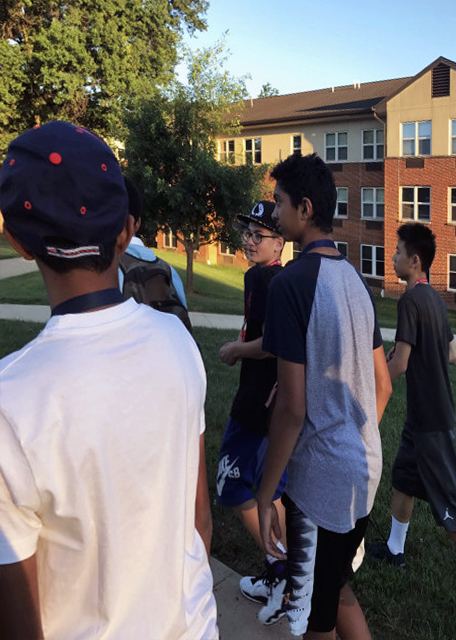2017-08-01
【Aiden in English】
The debate is entertaining. I love it a lot. But the complete and utter depressing thought of learning is around every corner. Today, I had little excitement. The stark truth is that this camp is essential for a specific class in school, where students learn about the debate system and its spirit. Today was a school day. I attended a classroom session, took notes, and asked numerous questions. The debate was an intricate, unfathomable world of unknown competition, much like sports. The idea was to counter every opposing argument while simultaneously attacking the opposite view. Our central debate throughout the camp was whether the United States government should fully fund universal health care, or UHC, a topic that is currently a hot issue in America, to say the least. The resolution itself sounds intimidating; however, once I got deeper into the topic, I realized it was much more than just a bunch of fancy words. Today was a more straightforward, explanation-filled class. Universal hints at how everyone should receive health care, but to what extent? Do non-citizens receive universal health care equally to citizens? How high would taxes have to be raised to implement viable health care? In which ways would the economy be affected by the drastic change in health care? I can't solve many of these questions, and I believe no one else at this camp can fathom a relatively close answer. However, the entire point of the debate is not to project a future society with UHC. It is more about convincing one judge that the government should begin a UHC program. With the definitions come a lot of annoying notes to keep track of. I must say, the number of notes taken is much more significant than in school. Most of the day involves staring at a screen, researching information that extends years beyond our education, and engaging in a specific debate jargon that would likely overwhelm a typical student's comprehension. In many lengthy discussions, the students and the teacher explored the central theme from both perspectives: What are the pros and cons of alternative values? So far, we have identified the fundamental values and arguments of the two sides: morality versus economics. This argument is nothing new, but the UHC debate has recently taken it to a new level. I don’t know much about how healthcare works other than its insurance aspect and the complaints about its imbalance. A side goal of winning for me would be to learn a bit more about the world. It’s ironic how people say the internet lies, yet it is the best way to discover the real world. 【紅霞譯】
辯論真的很有意思,令我格外開心,但學習向來都是苦與樂的思想交鋒,今天實在沒什麼太多興奮之處。說真格的,這個夏令營無異於學校開設的專業課,想讓學生了解辯論制度把握辯論鬥志。
今天可謂返校上課的日子。我走進教室,隨堂做了大量筆記,同時還問了不少問題,辯論是一個複雜奇妙難以預料的競爭世界,與體育運動非常相像,在攻擊對方觀點的同時,要做好對F立性駁論準備。
整個夏令營論題定為“美國政府是否應該完全贊助全民醫療保健“,它堪稱全美目前最熱門的話題,乍聽起來覺得危言聳聽,不過一旦深入思考,我意識到這場辯論遠非用華麗的詞藻就能應付了事的,而今天課堂上主要側重於簡單論證。
全民意味着每個人都應得到醫療保健,但在多大程度上?非公民是否平等享有公民醫療待遇?必須提高多少稅收才能得到切實可行的醫療保健?醫療保健的急劇變化對經濟會產生什麼樣的影響?
上面提到的大部分問題不光我無法解決,恐怕夏令營里沒人能夠琢磨出相對接近的答案。然而,辯論焦點不是向未來社會提供全民醫療保健,而是要設法說服評委相信政府應該開始推行全民醫療保健。
專用名稱後面記錄着一長串繁瑣的注釋,這樣便於搞清來龍去脈。我承認,到這裡所做的筆記要比上學完成的多得多,每天日程包括聚精會神盯住講台屏幕,研究那些超過我們教學大綱若干年之上的信息,並用一些準保叫普通學生抓狂的辯論術語交談。
我們學生與老師之間談論最多的話題應首推辯論雙方的中心思想,究竟正方與反方價值觀是什麼?到目前為止,我們已對基本價值觀和雙方論據達到共識:道德與經濟,這種辯論並不是破天荒頭一回,但近來國民對全民醫療保健的爭議已上升到新的高度。 坦率地說,除了保險公司及抱怨收支失調而外,我對醫保如何運作不太了解,希望能立足夏令營放眼全世界,搞笑的是人們常說互聯網瞎話連篇,但它卻不失為揭示真實世界最佳手段。 Today in History(歷史上的今天): 2014: YMCA Camp─Play B-Ball w/ Fever(基督教青年會營─帶病上陣) 
Campmates (營員) Crosslinks(相關博文): 2017: Capitol Debate Camp Day-2(國會辯論夏令營第二天)
2017: Capitol Debate Camp Day-1(國會辯論夏令營第一天) 8th Grade(初中三年級) |
